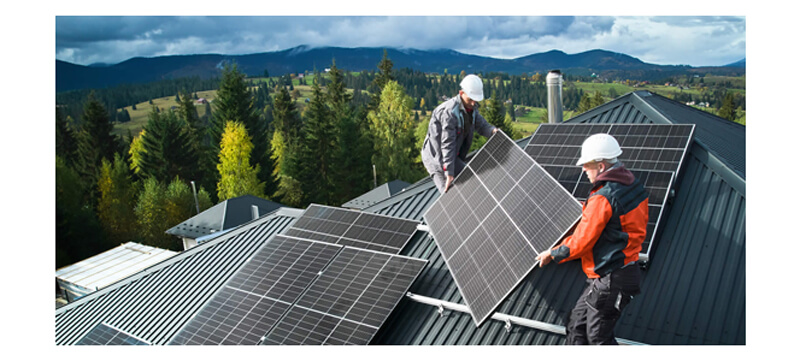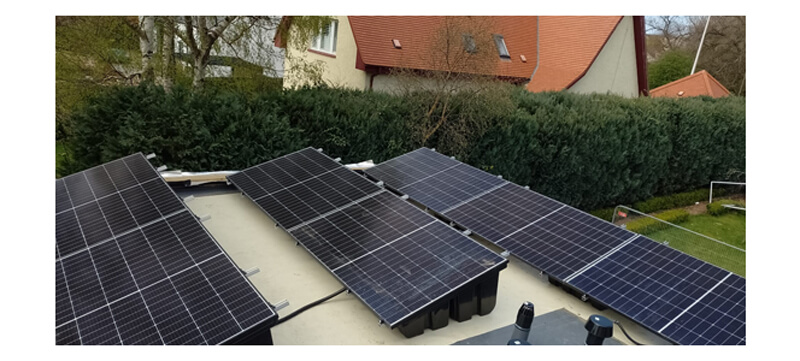Content
Solar energy has seen remarkable growth across the world, but many wonder if it’s a wise investment in countries with less sunshine, such as Scotland. Given Scotland’s notoriously variable weather and northern latitude, residents and businesses often ask if solar panels are worth the cost. In reality, Scotland’s solar energy potential might surprise you.

Solar Potential in Scotland
Scotland receives around 700 to 1,100 hours of sunshine per year, depending on the region. Although lower than sunnier areas like southern England or continental Europe, solar panels are still viable due to technological advances in photovoltaic (PV) efficiency. Modern solar panels can now generate electricity from daylight rather than requiring direct sunlight, making them effective even under cloudy conditions typical in Scotland.
Scotland’s lengthy summer days also contribute to solar efficiency, particularly between April and September. During these months, the country enjoys extended daylight hours, compensating for fewer sunshine hours compared to sunnier climates. Additionally, winter energy needs may be met by supplementing with other renewables or using stored power, as many Scottish homes now incorporate battery storage alongside solar systems.
Financial Incentives and Support
The financial viability of solar panels in Scotland improves significantly with government incentives and subsidies. The UK’s Smart Export Guarantee (SEG) compensates homeowners for the surplus electricity they export back to the grid, offering long-term returns. The SEG allows residents to offset their energy costs and earn through grid contributions, making solar a financially appealing choice. Scotland also benefits from government schemes offering grants and loans for renewable energy systems, reducing initial costs.
Over time, the steady decrease in solar panel prices has made solar installations increasingly affordable. The average cost of a 4kW system for a typical Scottish home is now around £4,000-£6,000, depending on specific requirements. With SEG payments and potential savings on energy bills, the payback period for Scottish solar installations generally falls within 10-15 years.
Reducing Carbon Footprint and Energy Independence
As Scotland transitions towards renewable energy, solar panels offer homeowners and businesses a chance to contribute to the nation’s ambitious net-zero goals. Solar energy drastically reduces household and commercial carbon footprints by providing clean electricity and decreasing reliance on fossil fuels. Scotland’s grid is already largely powered by renewable sources, but solar panels can further enhance sustainability by directly offsetting energy needs with local, clean energy.
In areas where the grid isn’t fully sustainable, such as remote rural regions, solar panels can offer energy independence, reduce transmission losses, and allow communities to generate power autonomously. Battery systems can also store surplus energy, particularly useful in winter when solar production is lower, ensuring energy security and stability.
Local Climate and Solar Panel Durability
Scottish weather may seem challenging for solar installations due to frequent rain, snow, and wind. Fortunately, solar panels are designed to withstand various weather conditions, with durability standards that make them resilient in wet and windy environments. Many panels are built to endure extreme weather, and installations are rigorously tested for efficiency in variable climates.
Rain, often seen as a hindrance, actually helps keep panels clean by washing away dust and dirt, which can increase efficiency slightly. Snow generally melts quickly on panels due to their angle and the absorption of residual daylight, allowing panels to continue producing power throughout the year.
Long-Term Investment Benefits
While some remain cautious due to Scotland’s weather, installing solar panels provides numerous long-term benefits, including consistent savings on energy bills and a tangible reduction in environmental impact. Rising energy prices, coupled with decreasing installation costs, further enhance solar’s appeal.
Enhanced Property Value
Solar panels can also increase the value of a property, appealing to eco-conscious buyers and those looking to reduce utility costs. As energy-efficient homes become more desirable, properties with solar installations can stand out in the housing market, particularly as awareness of renewable energy grows. Buyers are increasingly willing to pay a premium for homes with energy-saving features, and solar panels can be a key selling point, especially in markets where energy costs are high.
In Scotland, this trend aligns with a larger movement toward sustainability, supported by governmental and societal initiatives aimed at reducing carbon emissions. Solar panels can serve as a forward-looking investment in properties, providing appeal in an evolving market that increasingly values energy efficiency and environmental responsibility.
Solar Panel Options for Scotland's Climate
For those concerned with Scotland’s lower sunlight levels, high-efficiency solar panels are available, designed specifically to perform well in low-light conditions. Brands specializing in these panels often use monocrystalline technology, which is more efficient in cloudy weather compared to traditional polycrystalline models. Newer technologies, such as bifacial panels that capture sunlight from both sides, are also gaining popularity and may yield higher energy outputs, particularly during Scotland’s long summer days.
Solar panel systems can also be customized with optimizers or microinverters to improve efficiency, especially if there are partial shading issues. This allows each panel to operate independently, enhancing energy production even if one panel is partially shaded by a chimney, tree, or building. Given Scotland’s architectural diversity and unique landscapes, these flexible solutions ensure that solar power remains practical for many different types of homes and commercial properties.
Offsetting Scotland's Energy Demands and Contributing to a Sustainable Future
The Scottish government has made strides in renewable energy, setting ambitious goals to combat climate change and reduce reliance on non-renewable energy sources. By investing in solar energy, residents can play a role in supporting Scotland’s sustainability goals. Solar energy helps reduce demand on the grid, enabling Scotland to focus more resources on expanding and improving its renewable energy infrastructure.
For businesses, solar installations can represent a powerful commitment to sustainability, showing customers and stakeholders a willingness to invest in environmental responsibility. By choosing solar, companies in Scotland can demonstrate a forward-thinking approach that aligns with Scotland’s clean energy vision, potentially enhancing their brand reputation and attracting eco-conscious clients.
Scotland’s Growing Solar Energy Industry
While traditionally viewed as a less solar-friendly location, Scotland is witnessing a growing solar industry, with more local companies offering customized solar solutions suited to its unique climate. Scottish renewable energy firms now specialize in solar panel installations and maintenance, enabling easy access to support and service for both residential and commercial installations. Local expertise in Scotland’s weather conditions and energy needs also means that system designs are increasingly efficient and tailored to perform optimally in the Scottish environment.
In rural communities, cooperative solar projects are gaining popularity, allowing residents to share resources and costs for larger solar arrays that benefit entire neighborhoods. These collective initiatives not only reduce costs but also foster community resilience and energy independence, helping small Scottish communities achieve sustainability goals and energy savings.
With these evolving technologies, financial incentives, and Scotland’s own commitment to clean energy, the case for solar panels in Scotland is compelling for those looking to reduce their energy costs, increase property value, and contribute positively to the environment. Solar is indeed a viable and beneficial choice for many Scottish residents and businesses, paving the way toward a greener, more sustainable future.

Overcoming Common Myths About Solar Energy in Scotland
Several misconceptions may prevent homeowners and businesses in Scotland from investing in solar energy. One of the most common myths is that solar panels won’t function effectively due to the country's overcast climate. However, as mentioned earlier, modern solar panels capture both direct sunlight and diffused daylight, meaning they still generate electricity even when the sky is cloudy. Scotland’s total annual solar radiation is, in fact, comparable to parts of Germany—a country with one of the world’s highest solar adoption rates.
Another misconception is that solar panels are only feasible in urban areas. Although installation in rural or remote areas may require logistical planning, rural properties often benefit more significantly from solar due to increased roof space and exposure. Additionally, battery storage solutions can make solar panels an excellent investment for remote properties by ensuring energy is available during peak demand or on less sunny days.
Battery Storage and Smart Home Integration
Battery storage systems are becoming an essential part of solar installations in Scotland, offering homeowners the option to store excess energy generated during daylight hours. This stored energy can then be used in the evening or during cloudy periods, helping households remain less dependent on the grid. For Scottish winters, when daylight is limited, battery storage can provide critical support by capturing and retaining energy generated on brighter days.
Furthermore, integrating solar panels with smart home technology can optimize energy usage even more. Smart systems can prioritize solar power usage when it’s available, automatically shifting energy-intensive activities, like charging electric vehicles or heating water, to sunny hours. This integration can reduce reliance on grid energy and lower electricity bills, making solar energy even more efficient and practical for Scottish homes.
Future Trends in Solar for Scotland
As renewable energy technologies evolve, Scotland’s solar landscape is expected to become even more favorable. Improvements in PV panel efficiency, battery storage capacity, and inverter technologies mean that future solar installations will likely generate more energy, store it longer, and operate more efficiently than today’s systems. For instance, advances in thin-film solar cells and perovskite materials could increase solar panel output even under low-light conditions, which could be particularly beneficial in Scotland’s variable climate.
On a larger scale, Scotland’s energy landscape is shifting toward decentralized power generation, where small-scale, local sources of electricity (like solar) reduce the strain on national infrastructure. By supporting solar energy, Scots can contribute to a more resilient energy network and potentially lower costs for all.
Conclusion
Investing in solar panels in Scotland is a decision with long-term benefits that go beyond energy savings. From reducing carbon footprints and increasing property values to achieving energy independence and supporting Scotland’s green goals, solar energy is proving itself viable and advantageous even in less sunny climates. With supportive government policies, innovative technologies, and the drive toward a sustainable future, solar energy in Scotland has never been more promising. Whether you’re a homeowner or a business owner, making the switch to solar could be one of the most sustainable and impactful choices you make.







